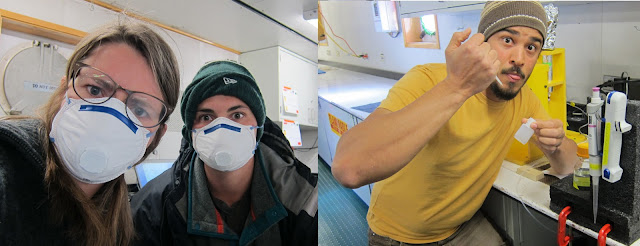Week 6
GO-SHIP 2018 S04P, NBP
18-02 Sunday April 22, 2018
Week 6 –Moving
eastward along 67°S
Last week we left you having finished Station 66, and doing
weather patterns (a ship’s version of pacing) on the northwest side of the
enormous B30 berg and its icy entourage. It took 3 full days before we were in
a position to put the rosette in at Station 67 on the eastern side of the
iceberg field. Over much of that three-day
span we saw sustained 30-40 knot winds gusting to 50 knots with blizzard
conditions in 20 ft seas. We have radar so we could see the icebergs around us,
but the smaller (house-sized) chunks that were breaking off in the storm were
more problematic. The bridge crew had to keep the coffee on and their eyes peeled,
particularly at night when whiteout conditions were not uncommon. We were thankful for receiving numerous
personalized weather updates from both stateside and McMurdo. We discussed and
analyzed various ideas for changing our track to try to get out of the weather and
get some work done, but in the end we decided that our best option was simply
to wait it out. We did manage to deploy our last two Global Drifter Program
drifters on the 16th (thank you Rachel and Jenny for braving the
elements).
 |
| Photos by A. Macdonald |
 |
| Photo: A. Macdonald |
 |
|
When it’s icy outside, there’s
nothing like deploying a couple of drifters to raise the spirits. We call it
“doing science.” (Photo: A. Macdonald)
|
One of my jobs, with Ellen’s much appreciated assistance,
is to come up with a new station plan that takes that three-day weather delay
into account. It is hard not to panic and make up the time immediately, but we
wanted to keep our nominal 30 nm station spacing as we crossed in the eastern
Ross Gyre where the Antarctic Circumpolar Current dips southward. We adjusted
to longer spacing once we were out of this region. We are now beyond our half way mark in
stations, transits and distance across the basin. Although, we have had to
replace our pumps more than once, the vast majority of observations we have
collected are up to standard. A number of us are looking at the data in
comparison to previous occupations and determining that the story is not as
simple as warming and freshening or even the opposite.
 |
| Our first EM-APEX float deployment. |
Yesterday, we deployed our two APL EM-APEX floats off the
starboard A-Frame (right) and our sixth and final SOCCOM float, the
Southern Ocean Spy adopted and named by the New Hanover Township School (below).
 | |||
| The Southern Ocean Spy SOCCOM float before deployment - decorated by C.Cadot and R. Lekanoff |
We are now at day 46 and less than three weeks from the end
of science. We still had edible lettuce
yesterday and like our salad, we are perhaps a little frayed at the edges, but doing
well. Frustrating as the delay was, it did allow some time for looking at data
and getting through a few rounds of the cribbage tournament. Our group seems to
have no trouble coming up with things to fill our time. The Murder game that
was begun at the beginning of the cruise is still going strong. Though nobody seems to know for sure who is
alive and who is not. We have a Fuss Ball tournament and Chess tournament, and
there’s always drills and Taco Tuesday to look forward to. This resilience is good because we have
another storm heading our way with the promise of sustained winds to 35 knots
and gusts to 50 knots before midnight tomorrow.
And so is goes in the Southern Ocean.
Until next time,
Best regards,
Alison
Macdonald (Chief Scientist) and Ellen Briggs (Co-chief Scientist)



Comments
Post a Comment